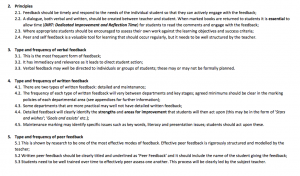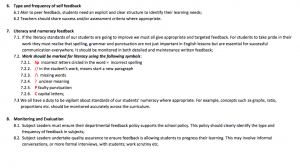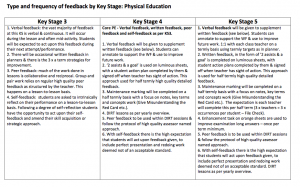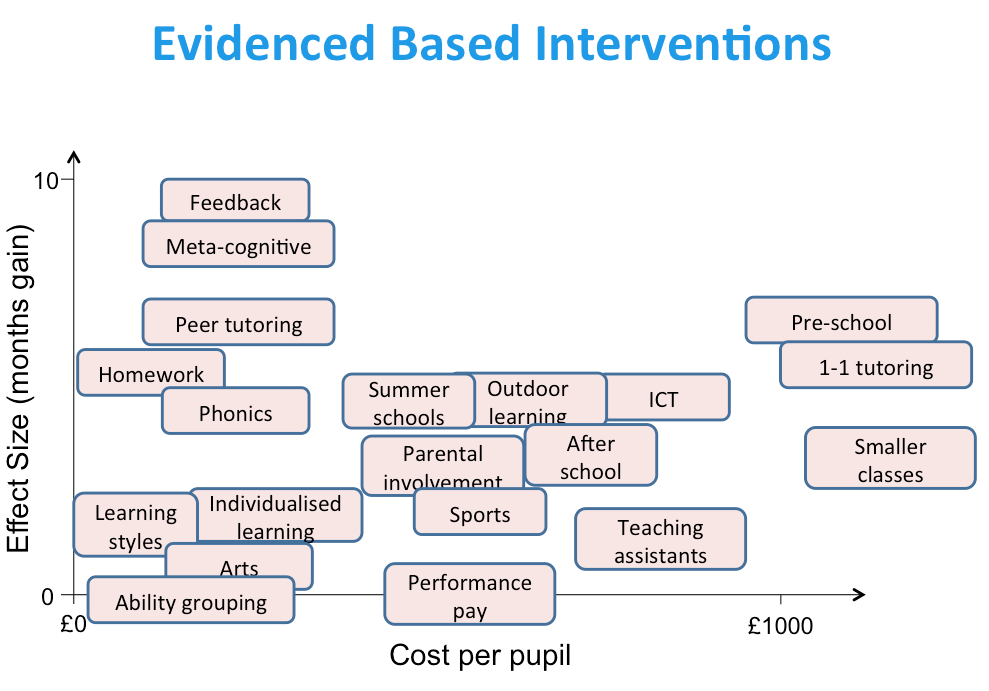(Image based on the Education Endowment Foundation Toolkit findings)
All the evidence tells us that great feedback works. Simple. Let’s do more of that and all of our students will gain…easy! And yet, what do we mean by feedback? What does great feedback look like in the classroom?
Too often the notion of feedback is wholly mistaken for written marking, but that is only one facet of great feedback. At Huntington School we have spend a great amount of time changing our marking policy into a ‘feedback policy’. It isn’t just a sleight of hand name change either, but a rethinking and a re-education for students, parents and teachers about what makes for meaningful feedback.
We needed to separate meaningful feedback on learning from the approaches devised to suit compliance and accountability measures. When once assessment for learning was commandeered by purveyors of coloured cups and the like, a fear-fuelled response to an OFSTED drive for feedback in students’ books led to us being mired in a flood of feedback.
Written feedback, because it is observable and fits into our model for accountability, is privileged over oral feedback. This is despite our knowledge that instant, synchronous oral feedback is always going to have greater impact than receiving formative comments days after you really need to enact them. Having an expectation that every subject on the curriculum is marking every week, or fortnight, is contorting learning to fit an accountability model (only last week I sat in a room with a huge number of Primary school teachers testifying that this is the case). Demanding that all written feedback, in whatever coloured pen you care to mention, is then responded to in writing by students, with the supposed ‘triple impact’ of a further teacher reply, only creates excessive demands that don’t correlate with the impact on learning.
The punitive pressures of OSTED have driven schools to implement a host of policies that enact a mass of written feedback that adds weight to teacher workload, but may not be worth it when it comes to impact on the learning of our students. With this in mind, it is worth restating the clarification coming from OFSTED themselves:
“Ofsted does not expect to see a particular frequency or quantity of work in pupils’ books or folders. Ofsted recognises that the amount of work in books will often depend on the age and ability of the pupils.”
Ofsted does not expect to see unnecessary or extensive written dialogue between teachers and pupils in exercise books and folders. Ofsted recognises the importance of different forms of feedback and inspectors will look at how these are used to promote learning.”
“Different forms of feedback” are indeed crucial. Peer feedback and self-feedback are both valuable learning tools. Evidence around peer tutoring, reciprocal learning and well structured group work, would indicate that well structured, clearly scaffolded peer feedback can prove effective. We know the teacher cannot, in most cases, give one-to-one feedback all the time. Well supported peer feedback can best supplement this essential work of the teacher.
Self-feedback shades into the area of metacognition and self-regulation that also figures highly on the EEF toolkit graph. We know, ultimately, that learning is school is a long and winding road from dependence on the teacher to more independent learning in readiness for life without a teacher. Self-feedback, well designed and supported, leads to crucial opportunities for deep thinking and learning.
Our Huntington School feedback policy aims to fulfill certain principles. An express aim is to only give feedback when it is needed and when it benefits learning: not to ensure arbitrary compliance.
You can view the full Feedback policy HERE.
I have made the mistake myself, using oral feedback stamps with the aim for helping students whilst ticking the accountability box – but, lo and behold, they didn’t work. Soon enough, I recognised my error and we got rid. A key principle is that oral feedback, peer and self feedback, are to be privileged and balanced against teacher written feedback in a meaningful way.
If we are going to spend our precious time and efforts giving feedback, then students need a good amount of time to respond to that feedback. DIRT – dedicated improvement and reflection time – is just as important as the giving of feedback. One simple truth about feedback is that students need to be working as hard, if not harder, than the teacher in this process.
Here are the core principles of the Huntington School Feedback Policy:


These principles may seem simple and indeed they are. There is no arbitrary date for how all subjects give feedback for example. Great feedback will look different in each and every subject discipline. Asking a Design Technology teacher to conduct feedback in exactly the same way as an English teacher is foolhardy.
This crucial tenet – namely subject specific expertise – has led to the second, and crucial, part of the feedback policy. The core principles of the policy outlined above are supplemented by twenty department specific policies – each on a side of A4. This adds complexity to the issue for parents, but we should recognise that learning is complex, messy and sometimes ugly.
Here is the effort from the Physical Education department:

We still have much to do when so many teachers have been brow beaten into giving feedback on anything that moves. Training students to execute and value peer and self assessment also takes work. The benefits for our students are clear: better outcomes. The benefits for our teachers are just as important: a more balanced workload and the promise of better quality teaching.
Related reading:
– ‘Have We Got Feedback Backwards?’ – This post questions the fetish for written feedback and provides some handy time saving feedback strategies.
– ‘The Fetish of Marking’ – David Didau writes typically skillfully about the issue of marking and he poses some interesting questions.
– ‘Marking, Feedback and Closing the Gap Policy‘ – take a look at this feedback policy from Penyrheol School
– ‘Make your Marking Policy a Feedback Policy‘ – back in February 2013 I wrote this blog based on our changing English department feedback policy – my views have developed since, but some principles stand.






Comments